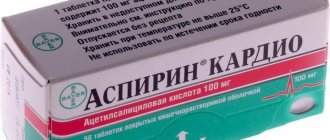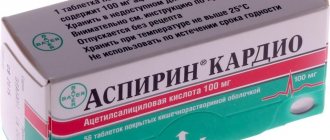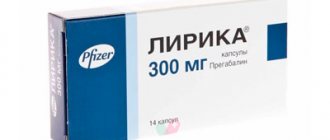More than once at an appointment I came across a situation where a patient without any obvious cardiovascular pathology prescribed cardiomagnyl (or thromboASS, cardio aspirin, etc.), being sure that absolutely everyone at his age (that is, “after 45 -50 years"), this is exactly the kind of prevention of cardiovascular diseases that is needed. After all, the neighbor also drinks, they say on TV that it’s necessary, and so on...
Is it really necessary?
The fact is that modern recommendations for the treatment of cardiovascular diseases (CVD) speak of the need for lifelong use of aspirin by those people who have already suffered any cardiovascular events. These include heart attack, stroke, transient ischemic attacks. As for the use of aspirin by people who do not have a history of any cardiovascular diseases, including those listed above, today the routine administration of aspirin (or other antithrombotic drugs) to such patients is not recommended due to the lack of evidence supporting First of all, the safety of such prophylaxis in this category of patients.
The most common side effect when taking aspirin is a negative effect on the gastric mucosa. Also, with its long-term use, the risk of bleeding of various localizations (gastrointestinal, hemorrhoidal, nasal, etc.) increases, and this fact cannot be neglected, because in certain situations such bleeding can become life-threatening.
In this regard, before prescribing aspirin to a patient, the doctor must assess the benefits and risks of taking it. In patients who have had a heart attack or stroke, the benefits of prophylactic aspirin have been shown to outweigh the possible risk of bleeding and are therefore recommended. And the role of aspirin in people who have no history of either one has not been fully studied. The scientific data that we have today indicate that there is no clear benefit from such prevention and, at the same time, an increased risk of bleeding of various locations. However, the issue remains poorly understood; large studies are ongoing, and we are waiting for their results.
As for patients of older age groups who have any risk factors for the development of cardiovascular diseases (arterial hypertension, high blood cholesterol, etc.), patients with diabetes mellitus, the situation is approximately the same: it has not yet been revealed that The benefit of taking aspirin outweighs the risk of bleeding in such patients, and therefore its use cannot be recommended routinely.
Aspirin: yesterday and today
– Do you have acetylsalicylic acid? – Do you need aspirin? - Yes, I can’t remember this word. Aspirin is the colloquial name for acetylsalicylic acid. Today this drug is included in the list of essential medicines of the World Health Organization (WHO) and in the list of vital and essential medicines in Russia. This medicine also has a rich and interesting history.
History and reasons for popularity
It is believed that acetylsalicylic acid was first synthesized by the French scientist Charles Frederic Gerard in 1853 from the bark of the willow tree. And in a form suitable for medical use, already in 1897, in the laboratory of the Bayer company, it was created by the German chemist Felix Hoffmann, who was trying to find a cure for his father, who suffered from rheumatism.
According to the laws of the German Empire at the time, chemical compounds were not subject to patenting, but a unique trademark could be registered. Therefore, the word “aspirin” was invented to name the new drug. “A” was taken from “acetyl”, “spir” from the Latin name for the herb meadowsweet, spirea, rich in salicin, “in” - as a typical ending for a word denoting a drug. At first, aspirin was sold in powder form, and since 1904 - in tablet form. Being inexpensive, effective and relatively harmless, it quickly became the most popular pain reliever.
In the Soviet Union, aspirin was a truly universal remedy: mothers and grandmothers canned cucumbers with it, it was added to poison for cockroaches, to cosmetic masks as a remedy for acne, to remove stains from sweat and blood, and was used as a hair rinse after swimming in chlorinated pool water. , fought the effects of insect bites and fertilized plants in gardens, treated dandruff and hangovers, added them to car batteries, used them instead of flux and rosin for soldering and made roses stay fresh longer, cleared blockages in sinks, treated calluses, and used them instead of a tonic.
It seems that Soviet people tried to use penny tablets in any way they wanted, just not for their intended purpose. From time to time, “cutting-edge” discoveries of aspirin substitutes appeared in the press. In its place, they offered tomatoes, honey, prunes, raisins, dill, raspberries, ginger and saffron. And dozens more different products that are useful from the point of view of traditional medicine. But the white willow bark always prevailed in this dispute.
And it is not surprising, since Hippocrates used its decoction in combination with poppy tincture as an antipyretic and analgesic. And in the 18th century, a British abbot conducted the first “clinical trials” in history, in which fifty fever patients participated. He proved the antipyretic effect of white willow bark extract and reported the results to the Royal Society.
Multifunctional medicine
But the main task of aspirin today is to prevent strokes and heart attacks.
Aspirin is known to prevent blood clots. The results of numerous studies indicate that the maximum positive effect from the preventive use of acetylsalicylic acid can be achieved if you take the drug for at least five years. At the same time, the drug is more effective in preventing heart attack in men, and stroke in women.
Currently, acetylsalicylic acid is the only antiplatelet drug whose effectiveness when prescribed in the acute period of ischemic stroke is supported by evidence-based medicine.
American oncologists want to include aspirin in recommendations for cancer prevention.
Experts have analyzed numerous research results that confirm the antitumor effect of aspirin. According to the scientists' findings, preventive intake of 75–325 mg of aspirin per day for ten years helps reduce the likelihood of colorectal cancer by 35%, and the risk of death from it by 40%. Moreover, among patients regularly taking aspirin, cancer of the esophagus and stomach developed 30% less often.
Taking aspirin daily reduces the risk of developing breast cancer by 20%. According to other studies, regular use of acetylsalicylic acid reduces the 20-year risk of developing prostate cancer by 10%, lung cancer by 30%, colon cancer by 40%, and esophageal and throat cancer by 60%.
Researchers at Harvard Medical School, together with colleagues from the Massachusetts Institute of Technology and Massachusetts General Hospital, have for the first time established that taking aspirin is associated with stopping the growth of vestibular schwannoma, a benign tumor that grows from Schwann cells of the auditory nerve. In some cases, it leads to the development of a lethal intracranial tumor and also causes hearing loss and tinnitus.
According to medical observations, aspirin also:
- relieves migraine attacks
(dose 2000 mg) as successfully as drugs specially developed for this purpose (the so-called triptan series), which can only be purchased with a doctor’s prescription. In fairness, it should be noted that both medications help only half of the sufferers, and only one in four bring complete relief from the attack. - lowers blood sugar levels
. This property of salicylates (the same ones that willow bark is so rich in) has been known to doctors since the 19th century. But the mechanism was discovered by young Chinese scientists only in 2003. It turned out that aspirin increases the sensitivity of cells to insulin, a decrease in which is the basis of type II diabetes. In 2011, the American Diabetes Association included 75–162 mg daily aspirin in its recommendations. - weakens the activity of Staphylococcus aureus
, a well-known hospital resident, which many become familiar with literally from birth. Staphylococcus does not bother anyone as long as it lives on the skin and mucous membranes. Its migration into the blood is dangerous. Especially for people with weakened immune systems: newborns, the elderly, postoperative patients. Alas, today the damned microbe has perfectly adapted to almost all known antibiotics. Therefore, the role of aspirin as a good ally in the fight against it is extremely important.
An unexpected use for the drug was discovered by researchers at the University of Chicago. They stated that aspirin may help combat intermittent explosive disorder. This is the inability to control aggressive impulses, which usually appears towards the end of adolescence.
Currently, studies are being conducted on aspirin as a means of primary prevention of complications of atherosclerosis and even...Alzheimer's disease.
Panacea? Not at all! Medical historians believe that mass use of aspirin (10–30 g each) significantly increased mortality during the 1918 influenza pandemic. And it has a lot of side effects... But the facts are stubborn things: more than 80 billion aspirin tablets are consumed annually, and in 2009, researchers discovered that salicylic acid, a derivative of which is acetylsalicylic acid, can be produced by the human body.
Valentina Saratovskaya
Photo thinkstockphotos.com
Product by topic: [product](acetylsalicylic acid), [product](aspirin)
Features of drugs when interacting with alcohol
In home medicine cabinets you can sometimes find many medications that are applicable in certain cases. But there are a number of pharmaceutical substances that are strictly incompatible with alcohol and alcoholic products. The main drugs not recommended for use in such cases are divided into groups:
- sleeping pills group of drugs;
- antidepressants;
- tranquilizers;
- antipyretic group based on paracetamol;
- analgesics;
- painkillers.
note
Medicines containing acetylsalicylic acid are not recommended due to possible internal bleeding. They arise from the interaction of gastric juice, alcohol and drug substances. As a result, the reaction can significantly damage the mucous membranes of the gastrointestinal tract and aggravate the condition of erosions, if any.
The main criterion in selecting a remedy that helps with a hangover is the composition and form of action of the drug. Therefore, no matter what pharmacological group the medicine belongs to, in the presence of ulcers and lesions of the stomach this is an unacceptable mistake. For those who do not suffer from such gastrointestinal diseases, there is a high risk of erosive spots appearing as a result of the interaction of acids.
Contraindications
Determining the effect of aspirin in certain cases is often difficult. Diseases in which the action of aspirin causes negative processes:
- gastrointestinal diseases;
- erosion and damage to the walls of the stomach;
- allergy;
- disorders of the kidneys and liver;
- chronic liver disease;
- asthma;
- chronic diseases of the cardiovascular system.
This group also includes persons with intolerance to the ingredients of the drug, undergoing hemodialysis and other courses of treatment using any medications.
Rules for taking medications
The symptoms of a hangover hinder a person’s functionality and put him in a state of weakness and malaise. The benefit of the drug will be optimal if it is taken correctly in accordance with the parameters established by the attending physician or with the specified recommendations in the instructions.
- It is unacceptable to swallow the tablet without liquid.
- Pills or effervescent powder must be diluted with a certain amount of water.
- It is strictly forbidden to take the tablet with alcohol, beer, tea or juice.
- You should not take the pill right before going to bed.
- It is good to take the powder in the morning, as this will determine the condition of the body for the whole day without causing harm.
The effect of the drug on the body has a different period. According to the indicated properties of aspirin, it begins to act within 10-20 minutes. If the effect does not occur, do not quickly swallow an additional tablet to improve the result. The recommended waiting time for the drug to act is indicated in the permissible probability and the approximate relationship between the properties of the drug and the body. Therefore, these dates are not reliable. It all depends on the person, the amount of alcohol and many other factors that slow down the body’s recovery process.
Benefit or harm
No special preparation or effort is required to take the drug. Many are accustomed to simply drinking an effective remedy, like everyone else, and hoping for optimal results. However, the characteristics of the body and its reaction to taking any medications do not have common features. In certain cases, the dosage, composition and form of tablets are established solely taking into account all factors of the body’s functioning. Therefore, the obviously false concept of universal benefit cannot be regarded as adequate. The benefits of taking aspirin will be received by those who take it responsibly and according to all the rules and recommendations. They will help avoid complications, unforeseen situations and bleeding only if used correctly and rationally.
Effect of the drug on the body
Given the controversial effectiveness of aspirin, it is important to remember that the determining role is played by the person’s condition, the characteristics of his body and the presence of any internal injuries and diseases. The illusory effectiveness of this medicine for such people can result in irreversible processes that can lead to death. The main positive aspects when taking medications of different pharmacological groups:
- improving blood circulation and providing oxygen to cellular structures;
- aspirin relieves any manifestations of pain and inflammatory processes;
- thins the blood and stimulates free circulation;
- reduces blood pressure;
- Acetylsalicylic acid does not cure, but alleviates the human condition.
Objective use of the drug is achieved thanks to the correct sequence and dosage, which was established by the attending physician. Many people take the pill the day before the upcoming feast. This allows you to significantly reduce the impact of alcohol on the body, prevent the appearance of hangover symptoms and provide yourself with a “morning without consequences.”









